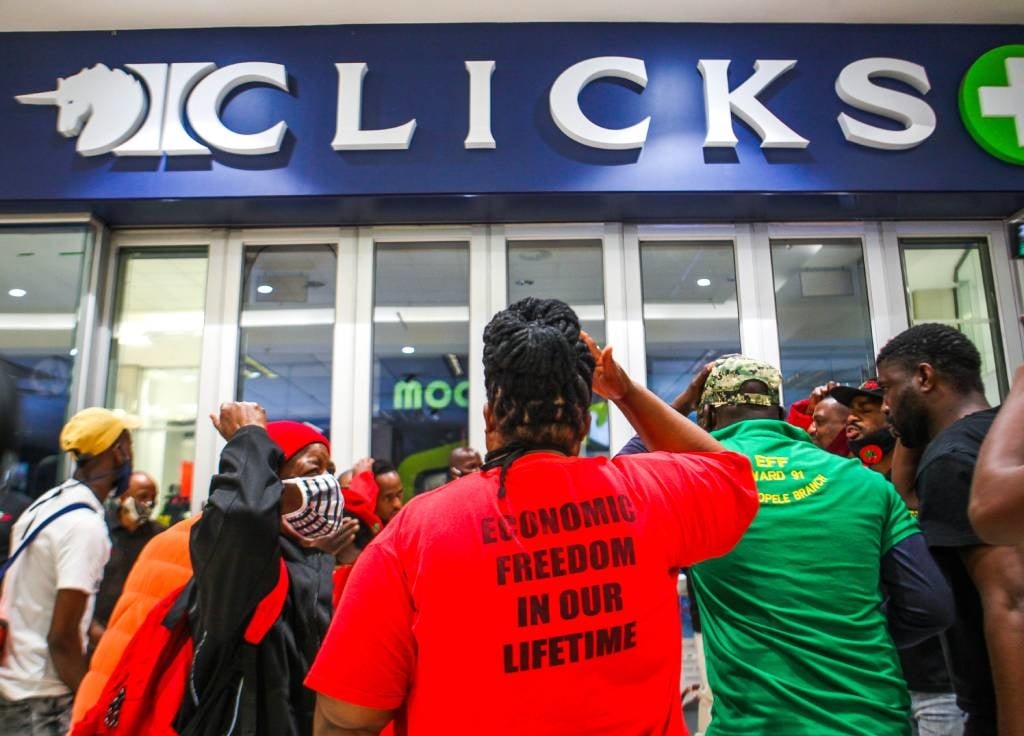


Members of the Economic Freedom Fighters (EFF) are seen at Sandton City Mall during the national shutdown of all Clicks outlets.
PHOTO: Sharon Seretlo, Gallo Images
- A post-Clicks hair controversy confab has propelled small black hair businesses to the front of the queue for new business.
- This after Unilever met the government and small business development champions.
- Their agreement will see special support for black women, young professionals and the disabled to ramp up their commercial opportunities.
The fallout from the offensive hair advertisement by retail chain Clicks will result in a boon for black hair professionals – in particular, black women, young professionals and the disabled – and their small businesses may soon have vital access to a range of commercial services to help them thrive.
This was announced by the government after Small Business Development Minister Khumbudzo Ntshavheni met members of the Unilever board and representatives of the Department of Small Business Development Agency (SEDA) and Small Enterprise Finance Agency (SEFA).
The hair advert scandal broke early in September and it was deemed racist and led to widespread violence outside the Clicks chain’s stores.
In a statement on Wednesday, the Department of Small Business Development quoted Unilever CEO, Luc-Olivier Marquet, on the subject of the TRESemmé advert: “We were shocked to discover that we had supplied images for the Clicks website that portrayed black hair as inferior. This was racist and we apologise unreservedly.”
He continued:
We immediately began an investigation to understand what happened. At the same time, we began reviewing all the marketing campaigns and images in our South Africa portfolio to make sure they match our commitment to celebrate all beauty and promote diversity and inclusion.
The department said Marquet also recognised the need for the acceleration of the diversity and inclusion agenda in corporate South Africa and the pivotal role boosting black businesses would play in this agenda.
Central to this, Unilever had set up an advisory board to “develop programmes to deliver immediate support to black hair stylists and small professional salons”, the department said.
Commitment to ‘participate meaningfully’
“It was noted that although 95% of Unilever products sold in South Africa are manufactured within the country, the bulk of the input materials for such manufacturing are imports which significantly dilutes the benefits to South Africa in the Unilever supply value chain.”
This would now be addressed.
Unilever had already identified materials that could be manufactured locally and committed to work with the department “to build capability of SMMEs, in particular black, women and youth-owned and those owned by persons with disability to participate meaningfully in this manufacturing”, the department announced.
In a second imminent boon, small businesses could soon have access to a range of Unilever’s commercial capacity and partners, including third party manufacturing, logistics platforms and SMME-products route to market assistance.
In reciprocation, the minister said the department would also bring help to the party, which includes speeding up the qualification of small businesses to participate in various Unilever programmes.
In a third constructive pivot from the scandal, the department would partner with Unilever’s programme to support black hairstylists and small professional salons through its programmes to support informal and micro personal care services.
The minister “accepted the offer by Unilever to partner on the spaza and general dealers support programme to ensure the success of spaza shops as the next frontier for convenience shopping in townships and rural areas”.
Did you know you can comment on this article? Subscribe to News24 and add your voice to the conversation.

